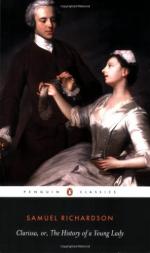Even as you make it, Mr. Lovelace, this matter is not a light one. But I fear it is a great deal heavier than as you put it.
What reasons have you to fear this, Sir? What has the lady said? Pray let me know. I have reason to be so earnest.
Why, Sir, Miss Howe herself knows not the whole. The lady promises to give her all the particulars at a proper time, if she lives; but has said enough to make it out to be a very bad affair.
I am glad Miss Harlowe has not yet given all the particulars. And, since she has not, you may tell Miss Howe from me, that neither she, nor any woman in the world can be more virtuous than Miss Harlowe is to this hour, as to her own mind. Tell her, that I hope she never will know the particulars; but that she has been unworthily used: tell her, that though I know not what she has said, yet I have such an opinion of her veracity, that I would blindly subscribe to the truth of every tittle of it, though it make me ever so black. Tell her, that I have but three things to blame her for; one, that she won’t give me an opportunity of repairing her wrongs: the second, that she is so ready to acquaint every body with what she has suffered, that it will put it out of my power to redress those wrongs, with any tolerable reputation to either of us. Will this, Mr. Hickman, answer any part of the intention of this visit?
Why, Sir, this is talking like a man of honour, I own. But you say there is a third thing you blame the lady for: May I ask what that is?
I don’t know, Sir, whether I ought to tell it you, or not. Perhaps you won’t believe it, if I do. But though the lady will tell the truth, and nothing but the truth, yet, perhaps, she will not tell the whole truth.
Pray, Sir—But it mayn’t be proper—Yet you give me great curiosity. Sure there is no misconduct in the lady. I hope there is not. I am sure, if Miss Howe did not believe her to be faultless in every particular, she would not interest herself so much in her favour as she does, dearly as she loves her.
I love Miss Harlowe too well, Mr. Hickman, to wish to lessen her in Miss Howe’s opinion; especially as she is abandoned of every other friend. But, perhaps, it would hardly be credited, if I should tell you.
I should be very sorry, Sir, and so would Miss Howe, if this poor lady’s conduct had laid her under obligation to you for this reserve.—You have so much the appearance of a gentleman, as well as are so much distinguished in your family and fortunes, that I hope you are incapable of loading such a young lady as this, in order to lighten yourself—— Excuse me, Sir.
I do, I do, Mr. Hickman. You say you came not with any intention to affront me. I take freedom, and I give it. I should be very loth, I repeat, to say any thing that may weaken Miss Harlowe in the good opinion of the only friend she thinks she has left.
It may not be proper, said he, for me to know your third article against this unhappy lady: but I never heard of any body, out of her own implacable family, that had the least doubt of her honour. Mrs. Howe, indeed, once said, after a conference with one of her uncles, that she feared all was not right on her side.—But else, I never heard—




